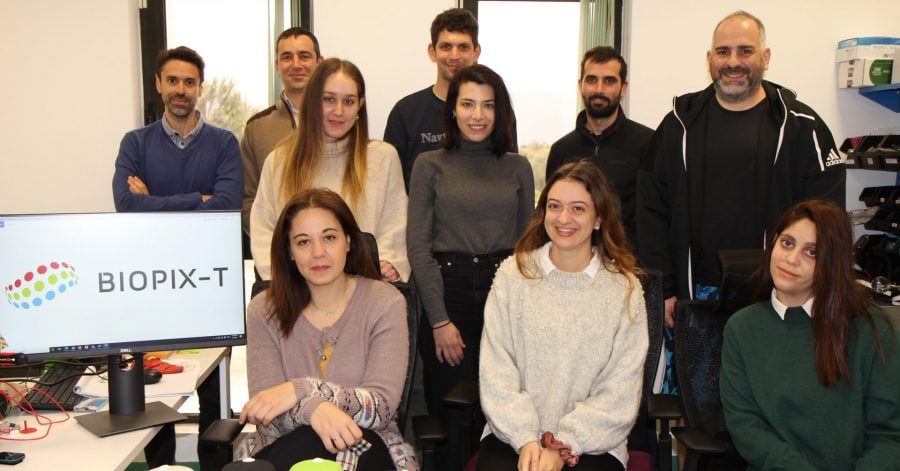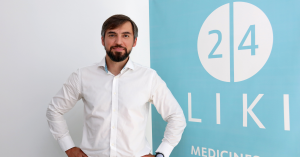Due to the necessity and the high public awareness for early infectious disease diagnostics, the Covid-19 pandemic аccelerated the demand for diagnostics products and caused a shift away from centralized laboratories to decentralized point-of-care (POC) testing. Therefore, companies specializing in the development of high accuracy POC diagnostics technologies have the potential to significantly improve the way standard lab testings are done by making portable diagnostics solutions available to people all around the world no matter their financial status and medical training. The need for constant R&D in the infectious disease diagnostics field and the future promising impact of such solutions have made investors highly interested in financing the growth of innovative and medically credible startups.
Today, the Greek biotech company Biopix-T, which develops POC molecular diagnostic devices, closes its €1.45М seed round that started back in September 2020 with the investment of the Greek early-stage Metavallon VC and a group of local angel investors from the healthcare sector and concluded with the investment of the Bulgarian pre-seed and seed Eleven Ventures. The startup develops the Pebble device, which is a portable micro-lab that produces highly accurate results in less than half an hour and uses Bluetooth to automatically transfer the results and store them in an online database. The seed round financing will be used to boost the manufacturing and distribution of the initial rollout of the Pebble device and for the conduction of associated tests. The team of Biopix-T shares that they will also invest in R&D in order to realize their current ideas and projects aimed at the further democratization of molecular diagnostics.
The Partner of Eleven Ventures Valeri Petrov explains that the “new normal” and the trend for personalized medicine will create a future need for tests to be performed at point-of-care, which require rapid and cost-effective methods that could be performed not only outside the traditional lab environment but in any place and under any circumstances, such as in remote and isolated areas or even in space. “These trends and Biopix’s potential go well beyond the current Covid-19 related market as the platform can be used for other pathogens and for companion diagnostics as well, which is of vital importance for the future of individualized, targeted treatments and therapies,” highlights Petrov. Likewise, George Karantonis who is a Partner at Metavallon VC recognizes that that in the short-term Biopix-T has great growth potential as an additional tool to control the Covid-19 pandemic while in the mid-to-long term it can be used as both POC diagnostic device for respiratory and other infectious diseases and as a companion diagnostics device.
Biotech molecular precision meets commercialization
Biopix-T is a spin-off startup of Biosensors Lab of the Institute of Molecular Biology and Biotechnology at the Foundation for Research and Technology – Hellas, which was started in 2019 by George Papadakis, Electra Gizeli, Alexandros Pantazis, Nikolas Fikas, and Sergios Katsaros. Initially, in order to develop the prototype of the IRIS device, the founding team received a proof-of-concept award from the Greek Patras Science Park, and after they were able to create a fully functional prototype in April 2019, a couple of months later, they were subsequently supported by Metavallon VC, Greek angel investors and a significant grant from the EU Horizon 2020 Covid-19 response call.
Realizing that despite the full functionality of their first prototype device IRIS, the product was not designed for mass production, the founding team of Biopix-T focused on the development of a new device that would be easy to commercialize. That is how they came up with the more user-friendly, simpler, and cheaper to manufacture Pebble device which was also designed not to be 3D printed but injection molded. Sergios Katsaros explains that the two main applications of the Pebble device are for standard molecular diagnostics protocol and for the detection of viruses in a crude sample. Compared to alternatives such as PCR tests, the advantages of Pebble are that it is less expensive, needs less time to confirm the results, and that is operated through an app running on an Android device, which makes it more intuitive.
Katsaros clarifies that the accuracy of POC diagnostics devices is as high as the accuracy of any other molecular tests with the difference that it can be performed from anywhere and this is exactly why the team wanted to bring molecular testing to the point of care. He further explains that the technology of other POC methods such as the widely used rapid tests will never be able to reach neither the sensitivity nor the specificity of a molecular test.

Accelerated growth thanks to regional support
Valeri Petrov shares that since the Covid-19 pandemic has caused the demand for fast and accessible tests to explode, Eleven Ventures recognized the potential of Biopix-T to commercialize their portable test in several months. The significance of the investment of Eleven Ventures for Biopix-T is that it will help the startup achieve a more regional character and will facilitate their expansion to the Bulgarian market, while for the Bulgarian VC it marks their first investment in a Greek startup. Valeri Petrov highlights that the founding team of Biopix-T has a scientific background and track record supported by and closely cooperating with leading international institutes and organizations in the field, and notes that the startup fits perfectly in one of their four focus areas, which is healthcare. According to him the device of Biopix-T responds to a long-pending need for portable molecular diagnostic devices that could produce lab-quality results at the point of care. “The Biopix-T diagnostic platform is coming right on time, much ahead of the competition in terms of both technological advantages and commercialization,” explains Petrov.
George Karantonis shares that Metavallon VC decided to invest in Biotex-T because of the lab standard accuracy of the device, its low cost, and versatility, which results from the fact that it is battery powered, the simple and fully automated operation, as well as because it is natively connected to the cloud and has the capacity to analyze samples without previous RNA/DNA extraction. From an investor’s perspective, he explains that Metavallon VC is looking for startups with defendable IP and sustainable competitive advantage that are founded by experienced and credible teams. He highlights that teams coming from the professional scene and academic institutions have the right mindset to understand what are the necessary steps to turn research results into successful products.
What do the present and the future of POC diagnostics look like?
As the pandemic has accelerated the pre-existing trend towards point-of-care testing, less effort is required on behalf of all participants in this market to convince the buyers of the use case. Moreover, the technology of Biopix-T’s device can be used for the diagnosis of various types of viruses because as Katsaros explains Pebble is a platform, and prior to infectious diseases, it had been used in the lab to detect food and plant pathogens, as well as specific mutations in the human DNA. Even though prior to the pandemic, the team of Biopix-T was concerned that alternatives could potentially make them obsolete, Covid-19 shook up their competition. As of now, Katsaros shares that they have not seen any alternative in the market that contains together all the merits of their device, in terms of functionality, portability, cost and energy efficiency, accuracy, and speed.
For the seven months that the startup has been operational, it has managed to emerge the technology from the lab and almost fully bring it to the market. In terms of business clients, besides diagnostic centers, so far the Pebble device has attracted the interest of hotels, cruise ships, airports. “Hopefully we are not more than a couple of months away from releasing our device together with the test kits for Covid-19 and Influenza A,” comments Sergios Katsaros.
In the short term, the Greek biotech startup will focus on obtaining a CE mark in order to start distributing the Pebble device and the test kits across the European market. ”It is important for attaining our mission, to release the product as soon as possible in the market and contribute as much as possible in containing the spread of the Covid-19 virus and its mutations,” notes Katsaros. In the long term, their goal is to widen the offering of available tests for infectious diseases and to enter the companion diagnostics and personalized medicine market. The team plans to turn the generation of the Pebble into the “Alexa” or the “Siri” of molecular diagnostics at home. Moreover, apart from developing and marketing an array of diagnostic tests themselves, they plan to start offering access to other companies who might be interested to develop and market test kits of their own on our platform.







